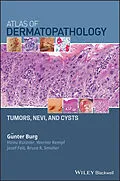Differential diagnosis is at its most accurate and efficient when clinical presentation and histopathological features are considered in correlation with one another. With this being so, the expert team behind this atlas has integrated both perspectives to create an innovative and essential resource for all those involved with the diagnosis of tumors, cysts, and nevi. Almost 1,400 full-color images clearly illustrate common patterns and variants of tumorous lesions of the skin and are helpfully contextualized by concise, straightforward descriptions of key features and diagnostic clues.
Whether they are aspiring or experienced practitioners, dermatologists and pathologists of all levels will find this an insightful and practically applicable addition to their bookshelf. Its far-reaching and easy-to-navigate coverage of relevant diseases of the skin provides trainees with an excellent grounding in the area, while practicing specialists may benefit from its use as a tool for the differential diagnoses of borderline cases.
Atlas of Dermatopathology: Tumors, Nevi, and Cysts offers a uniquely balanced, clear, and comprehensive guide to what can be a difficult process, and will be of tremendous assistance tostudents, dermatologists, dermatopathologists, and pathologists everywhere.
Autorentext
Günter Burg, MD is Professor of Dermatology and Chairman Emeritus, University of Zurich, Switzerland.
Heinz Kutzner, MD is Professor of Dermatology, Institute of Dermatopathology, Friedrichshafen, Germany,
Werner Kempf, MD is Professor of Dermatology, Department of Dermatopathology, University of Zurich, Switzerland.
Josef Feit, MD is Associate Professor of Pathology, University of Ostrava, Czech Republic.
Bruce R. Smoller, MD is Professor and Chairman of the Department of Pathology and Laboratory Medicine, University of Rochester, NY, School of Medicine and Dentistry.
Klappentext
A fully illustrated diagnostic aid for dermatologists and pathologists at all levels
Differential diagnosis is at its most accurate and efficient when clinical presentation and histopathological features are considered in correlation with one another. With this being so, the expert team behind this atlas has integrated both perspectives to create an innovative and essential resource for all those involved with the diagnosis of tumors, cysts, and nevi. Almost 1,400 full-color images clearly illustrate common patterns and variants of tumorous lesions of the skin and are helpfully contextualized by concise, straightforward descriptions of key features and diagnostic clues.
Whether they are aspiring or experienced practitioners, dermatologists and pathologists of all levels will find this an insightful and practically applicable addition to their bookshelf. Its far-reaching and easy-to-navigate coverage of relevant diseases of the skin provides trainees with an excellent grounding in the area, while practicing specialists may benefit from its use as a tool for the differential diagnoses of borderline cases. As with the authors' previous work on inflammatory dermatoses, Atlas of Dermatopathology: Practical Differential Diagnosis by Clinicopathologic Pattern, this important text:
- Takes an effective, pattern-based approach to dermatologic diagnosis
- Matches clinical and histopathologic perspectives to give a fuller diagnostic picture
- Aids accurate diagnosis with almost 1,400 illustrative images
- Is written and designed to be easily consulted in everyday practice
- Presents contributions from internationally renowned dermatopathologists
Atlas of Dermatopathology: Tumors, Nevi, and Cysts offers a uniquely balanced, clear, and comprehensive guide to what can be a difficult process, and will be of tremendous assistance tostudents, dermatologists, dermatopathologists, and pathologists everywhere.
Inhalt
Preface xv
Acknowledgments xvii
1 EPIDERMIS 1
Nevi 2
Epidermal Nevus 2
Variant: Inflammatory Linear Verrucous Epidermal Nevus (ILVEN) 3
Keratoses 4
Seborrheic Keratosis (SK) and Variants 4
Variant: Acanthotic Seborrheic Keratosis 4
Variant: Reticulated, Pigmented Seborrheic Keratosis 6
Variant: Flat Seborrheic Keratosis 6
Variant: Papillomatous Seborrheic Keratosis 7
Variant: Activated (Irritated) Seborrheic Keratosis 7
Variant: Dermatosis Papulosa Nigra 7
Variant: Melanoacanthoma (Pigmented Seborrheic Keratosis) 8
Variant: Clonal (Intraepidermal) Seborrheic Keratosis (Borst Jadassohn) 9
Variant: Seborrheic Keratosis with Monster Cells (Bowenoid) 10
Variant: Hyperkeratotic Seborrheic Keratosis (Stucco Keratosis) 11
Confluent and Reticulate Papillomatosis (Gougerot and Carteaud) 12
Reticulate Pigmented Anomaly of the Flexures (DowlingDegos Disease) 13
Acanthosis Nigricans 14
Solar (Actinic) Keratosis 15
Variant: Acantholytic Solar Keratosis 16
Variant: Atrophic Solar Keratosis 16
Variant: Lichen PlanusLike Solar Keratosis 17
Variant: Hypertrophic (Bowenoid) Solar Keratosis 18
Cornu Cutaneum 18
Acanthomas, NonViral 19
Solar Lentigo 19
Callus, Factitial Acanthoma 20
Knuckle Pads (Chewing Pads) 21
Pale (Clear) Cell Acanthoma 22
Large Cell Acanthoma 23
Differential Diagnosis: Epidermolytic Acanthoma 24
Differential Diagnosis: Congenital Ichthyosiform Erythroderma 25
Acantholytic Acanthoma 26
Warty Dyskeratoma 27
Porokeratoma (Porokeratosis Mibelli) 30
Acanthomas, Viral 31
Verruca Vulgaris 31
Variant: Verruca Plana 33
Variant: Condyloma Acuminatum 34
Bowenoid Papulosis 35
Acrokeratosis Verruciformis (Hopf) 37
Molluscum Contagiosum 38
Pseudocarcinomas and Neoplasms with Intermediate Malignant Potential 40
Keratoacanthoma (KA) 40
Epithelioma Cuniculatum (Verrucous Carcinoma) (EC/VC) 44
Papillomatosis Cutis Carcinoides 45
Florid Papillomatosis of the Oral Cavity (Oral Verrucous Carcinoma) 46
BuschkeLöwenstein Tumor (Giant Condyloma) 47
Malignant Epidermal Neoplasms 48
Bowen's Disease (Carcinoma in situ) 48
Variant: Clear Cell Bowen's Disease 50
Variant: Cutaneous Horn (Cornu Cutaneum) on Bowen's Disease 51
Variant: Pigmented (Anogenital) and Clonal Bowen's Disease 52
Variant: Erythroplasia of Queyrat and Vulvar Intraepithelial Neoplasia 53
Basal Cell Carcinoma (BCC) 54
Variant: Nodular BCC 54
Variant: Infundibulocystic BCC 56
Variants of BCC With Ductal, Matrical or Sebaceous Differentiation 57
Variant: Superficial BCC 60
Variant: Pigmented BCC 61
Variant: AdenoidCystic BCC 62
Variant: Sclerodermiform (Morpheaform) BCC 64
Clinical Variants: Ulcerating BCCs 66
Histological Variants: Metatypic BCC with Squamoid Differentiation 67
Syndromatic BCC (Basal Cell Nevus Syndrome, GorlinGoltz) 69
Fibroepithelioma of Pinkus 70
Squamous Cell Carcinoma (SCC) 72
Variant: WellDifferentiated SCC 72
Variant: Acantholytic SCC (Epithelioma Spinocellulare Segregans of Delacretaz) 74
Variant: Myxoid SCC 76
Variant: Follicular (Infundibular) SCC 77
Variant: Spindle Cell (Fusicellular) SCC 78
Squamous Cell Carcinomas in Special Sites 79
2 ADNEXAL 85
Sweat Gland Differentiation 86
Nevi, Hyperplasias, and Benign Adnexal Neoplasms (BAN) 86
Eccrine Differentiation 86
Apocrine Differentiation 93
Malignant Adnexal Neoplasms 105
Eccrine Differentiation 105
Apocrine Differentiation 109…
